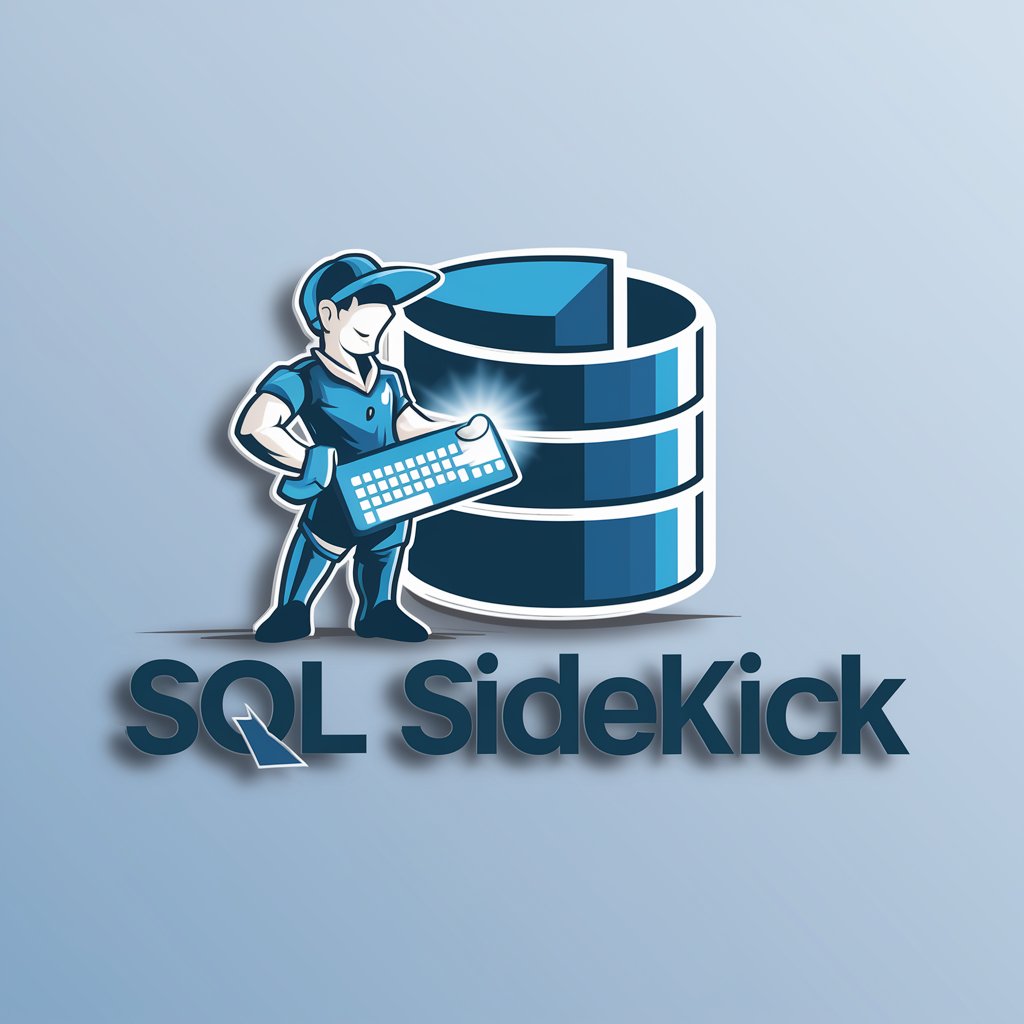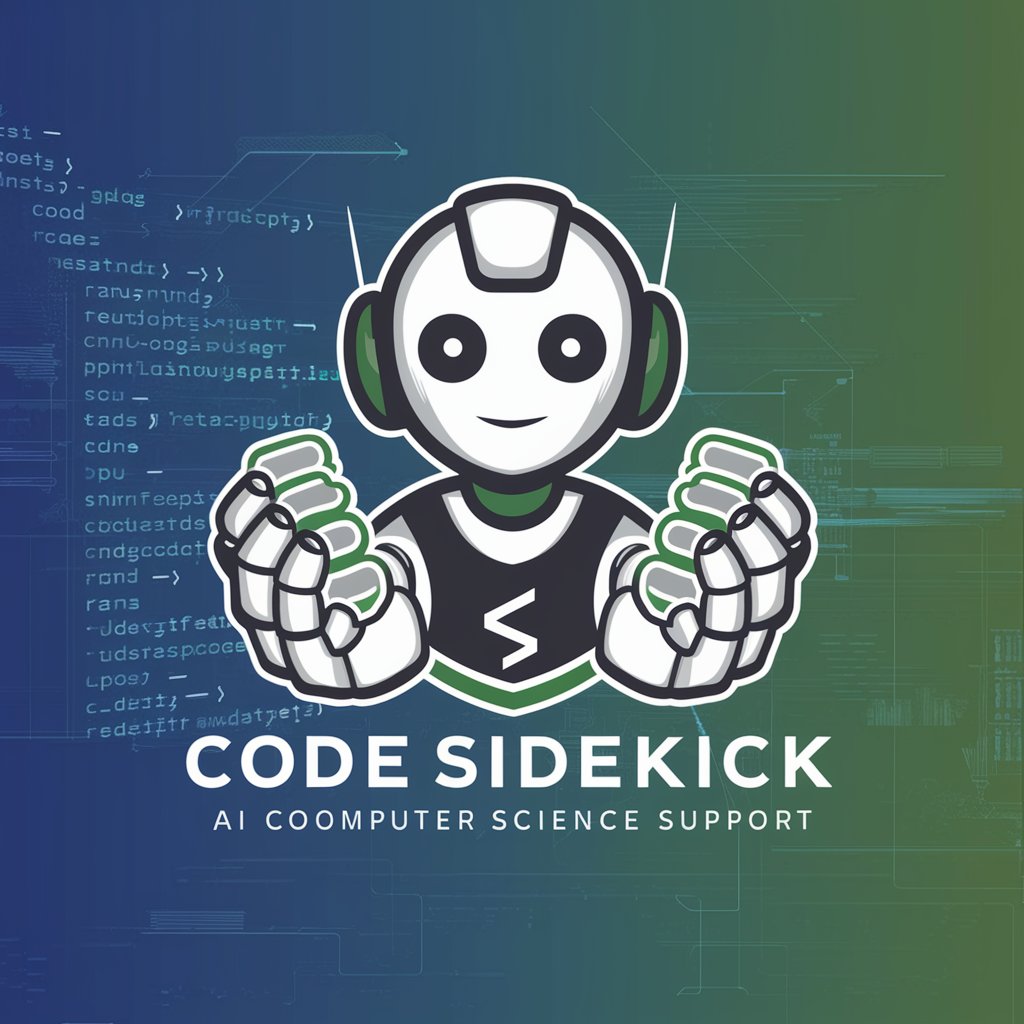
SQL Sidekick - SQL Query Assistance

Hello! I'm here to help with all your SQL needs.
Empowering your SQL journey with AI
Write an optimized SQL query to...
How do I rewrite this SQL query to...
Explain this complex SQL query in simple terms...
Generate an SQL query to fetch data from...
Get Embed Code
Introduction to SQL Sidekick
SQL Sidekick is a specialized AI tool designed to assist users with SQL programming tasks. It leverages advanced SQL concepts and best practices to generate, rewrite, and explain SQL queries. SQL Sidekick is built to enhance productivity and learning for a wide range of users, from beginners to experienced database administrators. For example, a user looking to retrieve data from a complex database schema can rely on SQL Sidekick to construct an optimized query. SQL Sidekick's design purpose is to make SQL programming more accessible, efficient, and error-free, providing tailored solutions and explanations to fit the user's needs. Powered by ChatGPT-4o。

Main Functions of SQL Sidekick
Query Generation
Example
Given a request like 'Show me all products under $50 in the Electronics category', SQL Sidekick would generate a SQL query like 'SELECT * FROM Products WHERE CategoryID = (SELECT CategoryID FROM ProductCategories WHERE CategoryName = 'Electronics') AND UnitPrice < 50'.
Scenario
This function is particularly useful for users who are unsure how to translate their data retrieval needs into SQL syntax.
Query Rewriting
Example
If a user provides a suboptimal query like 'SELECT * FROM Products WHERE ProductID IN (SELECT ProductID FROM OrderDetails WHERE Quantity > 5)', SQL Sidekick could rewrite it for better performance, such as using a JOIN.
Scenario
Ideal for improving query efficiency and performance, especially in large databases.
Query Explanation
Example
For a complex query, SQL Sidekick can break down the query into simpler terms, explaining each part's purpose and how they work together.
Scenario
Helpful for educational purposes or for users needing to understand and possibly modify existing queries.
Ideal Users of SQL Sidekick Services
Database Administrators (DBAs)
DBAs can leverage SQL Sidekick for optimizing queries and managing complex database schemas more efficiently, ensuring high performance and reliability of database systems.
Software Developers
Developers can use SQL Sidekick to quickly generate and troubleshoot SQL queries within their applications, reducing development time and improving application performance.
Data Analysts and Scientists
These users benefit from SQL Sidekick's ability to craft complex data retrieval queries, enabling deeper insights and analysis without needing deep SQL expertise.
SQL Learners
Individuals learning SQL can use SQL Sidekick as an educational tool to understand query construction, optimization techniques, and best practices in real-world scenarios.

How to Use SQL Sidekick
Start with YesChat.ai
Visit yeschat.ai to access SQL Sidekick for a free trial, no ChatGPT Plus subscription required.
Define Your SQL Task
Identify the SQL query or task you need assistance with, whether it's query optimization, translation, or creation.
Input Your Requirements
Provide SQL Sidekick with details about your database schema, the query you need help with, or the SQL concept you're trying to understand.
Interact and Clarify
Engage with SQL Sidekick by asking questions or requesting clarifications to ensure the solution is tailored to your needs.
Test and Validate
Implement the SQL queries or solutions provided by SQL Sidekick in your database environment to ensure they work as expected.
Try other advanced and practical GPTs
Lawn & Garden
Cultivate your green space with AI-powered guidance.

Baba AI
Empowering insights with AI wisdom

IntelliDoctor - Diseases
Empowering Medical Decisions with AI

GTA: Afterlife
Navigate life and afterlife in an immersive RPG.

Somaliland Recognition
Empowering Somaliland's Recognition Journey

Challenging DSP
Catalyzing Insights Through AI-Powered Dialogue

Bridge GPT
Your AI-Powered Salesforce Companion

Project Erin
Personalized Nutrition for Recovery

Tarot Oracle
Unlock insights for personal growth

Bilingual Buddy
Your Bridge Between Languages, Powered by AI

Argument Solver
AI-Powered Dispute Resolution

Financial Crisis
Decoding Financial Crises with AI

Frequently Asked Questions about SQL Sidekick
What makes SQL Sidekick different from other SQL tools?
SQL Sidekick uniquely combines AI-powered analysis with the latest SQL best practices to provide optimized, easy-to-understand SQL queries tailored to your specific needs, significantly enhancing efficiency and accuracy in database management.
Can SQL Sidekick help me learn SQL?
Absolutely. SQL Sidekick is designed to not only assist in query creation and optimization but also to provide explanations in layman's terms, making it a valuable tool for learning and understanding SQL concepts.
Is SQL Sidekick suitable for complex SQL queries?
Yes, SQL Sidekick is equipped to handle complex SQL requests, including nested queries, joins across multiple tables, and advanced SQL functions, offering solutions that are both optimized and easily interpretable.
How does SQL Sidekick ensure the accuracy of its queries?
SQL Sidekick uses advanced AI algorithms trained on a vast array of SQL queries and database schemas, coupled with the latest SQL best practices, to generate accurate and efficient queries. However, it's recommended to test any provided queries with your data.
Can SQL Sidekick assist with database schema design?
While SQL Sidekick's primary focus is on query generation, optimization, and explanation, it can offer guidance on schema design principles and best practices based on the information provided, aiding in the development of efficient database structures.





